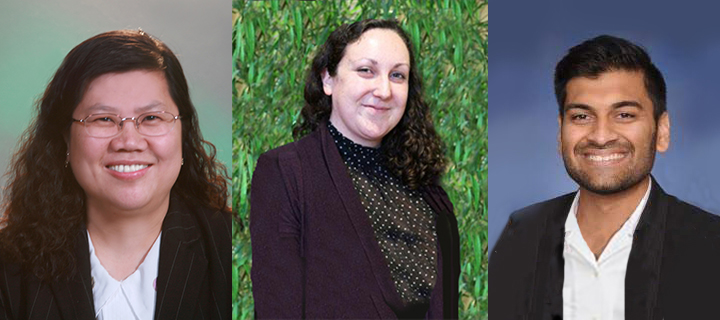An innovative University of Miami (UM) COVID-19 study has demonstrated the power of applying advanced computer resources to understanding viral transmission rates.
 The collaborative UM research team conducted a granular study of classroom interactions and the likelihood of transmitting the SARS-CoV-2 virus in an indoor setting.
The collaborative UM research team conducted a granular study of classroom interactions and the likelihood of transmitting the SARS-CoV-2 virus in an indoor setting.
“Unlike current models of COVID-19 transmission from reported or assumed interactions, we leveraged high-resolution observations to simulate infectious processes,” said Chaoming Song, Associate Professor of Physics and a Member of the Institute for Data Science and Computing (IDSC).
 “To our knowledge, this is the first study to apply Susceptible, Exposure, Infected, Recovered (SEIR) models to physically defined interactions in these contexts.” Song added that the likelihood of transmission increases when individuals are closer to each other, especially when face-to-face. “But we can’t tell which individuals will get the virus or not, because the answers are probabilistic,” he added.
“To our knowledge, this is the first study to apply Susceptible, Exposure, Infected, Recovered (SEIR) models to physically defined interactions in these contexts.” Song added that the likelihood of transmission increases when individuals are closer to each other, especially when face-to-face. “But we can’t tell which individuals will get the virus or not, because the answers are probabilistic,” he added.
 Professor Song was the senior lead author of a study, “Simulating COVID19 Transmission From Observed Movement: An Agent-Based Model of Classroom Dispersion,” recently posted at arXiv.org and under review at Scientific Reports. UM coauthors included Zhang Yi (above right), a Physics Department doctoral candidate who shared first authorship, and Yudong Tao (at left), Research Assistant.
Professor Song was the senior lead author of a study, “Simulating COVID19 Transmission From Observed Movement: An Agent-Based Model of Classroom Dispersion,” recently posted at arXiv.org and under review at Scientific Reports. UM coauthors included Zhang Yi (above right), a Physics Department doctoral candidate who shared first authorship, and Yudong Tao (at left), Research Assistant.
They were joined by Mei-Ling Shyu, Ph.D., Associate Chair and Professor at in the Department of Electrical and Computer Engineering; and Lynn K. Perry, Ph.D., Associate Professor of Psychology, as well as and Prem R. Warde, MSIE, former Director, Care Transformation, University of Miami Health System (L to R, below: Shyu, Perry, and Warde)
“With data science studies, it’s important to have people from different disciplines working together share their ideas and approaches to meeting global challenges”

“With data science studies, it’s important to have people from different disciplines working together share their ideas and approaches to meeting global challenges,” said Song.
 Coauthor Daniel Messinger, Associate Professor in the Child Division of the Department of Psychology, Coordinator of the UM Developmental Psychology Program, and Director of Social System Informatics at IDSC Data Ethics + Society, said the leading-edge study drew on data from prior studies used ultrawideing radio frequency identification (RFID) sensors to track the real-time movements and directional orientation of children and their teachers in four preschool classes over a total of 34 observations.
Coauthor Daniel Messinger, Associate Professor in the Child Division of the Department of Psychology, Coordinator of the UM Developmental Psychology Program, and Director of Social System Informatics at IDSC Data Ethics + Society, said the leading-edge study drew on data from prior studies used ultrawideing radio frequency identification (RFID) sensors to track the real-time movements and directional orientation of children and their teachers in four preschool classes over a total of 34 observations.
“Decreased classroom density and teacher vaccinations had highly beneficial impacts on transmission rates”
To develop their model, the UM team used risk guidelines published by the U.S. Centers for Disease Control and Prevention (CDC) to estimate the transmission impact of one infected student attending class on the proportion of overall infections, the average transmission rate, and the time lag to the appearance of symptomatic individuals.
“Using these metrics, we found that decreased classroom density and teacher vaccinations had highly beneficial impacts on transmission rates,” said Messinger. A classroom with only half capacity was associated with an 18.2% drop in overall infection rates, while teacher vaccinations were associated with a 25.3% drop.
“These simulation results of classroom transmission dynamics may inform public policy in the face of COVID-19 and similar infectious threats,” added Messinger. “Our model can be applied to other airborne viruses, including influenza and the Omicron COVID variant. Recognizing the global importance of viral transmission concerns, we have also made our model available for clinicians and researchers conducting their own simulations.”
Zhang, Yi, et al. “Simulating COVID19 Transmission From Observed Movement: An Agent-Based Model of Classroom Dispersion.” arXiv preprint arXiv:2108.07808 (2021).
Tags: Chaoming Song, Classroom Density, COVID-19, Covid-19 Transmission Rates, Daniel Messinger, Lynn K. Perry, Mei-Ling Shyu, Prem R. Warde, Preschool, Yudong Tao, Zhang Yi



